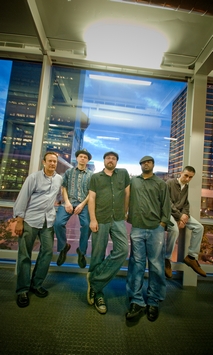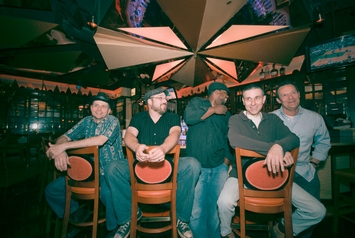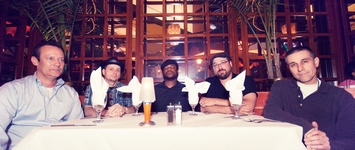social bookmarking tools:
 |
|
| Available RSS Feeds |
|---|
 - Top Picks - Top Picks |
 - Today's Music - Today's Music |
 - Editor's Blog - Editor's Blog
|
 - Articles - Articles
|
Add Louisville Music News' RSS Feed to Your Yahoo!
|

fattlabb: It's a Gas
Author's Note: With sincere apologies to the memories of Jay Ward, Bill Scott and Walter Tetley, we begin our story with a pastiche of a well-known cartoon and a hope that the method to the madness becomes clear. The last time I tried something like this, I pissed off a jazz musician and made an enemy for life, the sandbagging jackass. And WABAC is pronounced "way-back." Just in case you've forgotten.
"Sherman, set the WABAC machine to the autumn of 1997 in Louisville, Kentucky."
"Gosh, Mr. Peabody, that doesn't sound like a really important time or place. I can't think of anything that happened then."
"That's because I'm the genius here, while all you do is follow me and say 'gosh' a lot and set me up for one-liners. And quit scratching there. It might get stuck."
"Sorry, Mr. Peabody. So why're we going there?"
"I've taken a sudden interest in this band here. Take a look at their last CD."
"Huh? fattlabb? This doesn't look very interesting, Mr. Peabody. It looks like someone used a smudgy typewriter with white ink on some black paper to make this cover. Looks like something you'd find at a flea market on a table that also sells those mirrors with girls with letters on the backs of their panties that spell out the name of some beer. Hey, y'know I kinda like those."
"But it's the sound that intrigues me, Sherman. And according to my researches, the story behind that not-too-interesting thing you're holding. . .I'm sorry, Sherman, but you need to zip your pants up."
"Sorry, Mr. Peabody. So, this fattlabb is why we're going back to Louisville in the late 1990s?"
"Yes, Sherman, there were three jazz albums of note released in that city at that time. One was from a trio called the Java Men, the other was this extraordinarily ambitious jazz opera called Disarmageddon from Jak Son Renfro and the Ron Hayden Group and the third was a debut from a band called Splatch."
"Huh? I still don't get the connection, Mr. Peabody."
"Just set the WABAC, my boy and follow me. But please remember to turn off your cell phone this time. We don't want the WABAC's circuitry to go haywire if your mother calls you again. Remember when we were visiting Al Capone in the 1930s? She called, we vanished and the WABAC put us in some room with a dirt floor, then the brick wall in front of us started to crumble and there stood Geraldo Rivera."
"Yeah, that one was kinda hard to explain away. Hey, you think maybe they've got some of those mirrors with the girls in underwear on 'em back in 1997?"

One of the physical qualities of gas is that it expands to fill the space in which it is introduced, no matter how large the space is. Some bands have that same quality (some more gassy than others), their sound occupying the aural space of wherever they're performing powered by the number of people that are playing in it, or, more appropriately, how well they are using their instruments and what kind of musical strategy they are using. Is the keyboard there to provide the lead, or is it only part of the rhythm section? Is the lead guitarist there to add flavor throughout the whole song, or is he just there for a token scorching solo in each song? It's the kind of parts-to-whole question that would have puzzled Aristotle, but only because he never had the chance to bust out a locking tremolo.
One big part of a band's performance strategy is something the members should do to each other anyway while they're on stage: listening.
"The band listens well," said Tony McDaniel, trumpeter for fattlabb. "We all play well together. Everybody in the band is a really solid, good musician. When everybody pays attention and everybody typically does, it tends to work really well."
McDaniel, his bassist brother Pat, saxophonist Tim Whalen, guitarist Stephen Couch and drummer Shawn Williams make up the current incarnation of fattlabb, a band with its roots in a tasty, shake-yo-ass amalgam of jazz and funk with exact rhythms that fire off better than new spark plugs. fattlabb has now expanded that sound to blend in lush sax solos, some acoustic guitar, even vocals on a rare occasion. Musically, they have expanded the range of what they can play and, like a gas, they're filling every square inch of that range with music they claim no other Louisville band is making.
"It's like a rock or funk rhythm section," said guitarist Couch. "It's got these two guys [McDaniel and Whalen] on the top, then I'm kind of in the middle doing a lot of atmospheric things, trying to fill it out. On some tunes, it sounds like we need a DJ, on others it sounds like we need a harmonica player. It's somewhere in between a rootsy place and a hip-hop place, always keeping the jazz horns on top of it. It's a lot more adventurous that way without drawing too much from pre-1960 jazz thing."
"It's a lot like southern soul," McDaniel added.
"A little bit of Miles, a little bit of James Brown," said saxophonist Whalen.

"It's really hard to identify," bassist Pat McDaniel said. "We kind of have our own sound."
The varied backgrounds of fattlabb's current lineup might normally cause some brow-knotting and head-scratching among those who assume that all members of a band have to share the same influences or have grown up listing to the same kinds of records ("Yeah, we're all, like, into Nirvana and Kiss and Zep, man. And our drummer really pounds it out like that dude from Foghat. And we all try to sing like that guy from Styx. No, we haven't had a gig yet, man. We've sent out press kits, though. Why're you asking?").
That's rarely the case with any band and that is especially not the case with fattlabb.
"We don't want to feel like we're limited," Tony McDaniel said. "We don't want the band to be categorized in a way."
"Yeah. How many bands play John Coltrane and Johnny Cash?" asked Whalen.
So to try to understand fattlabb's musical strategy, we'll need to follow Mr. Peabody and Sherman into the WABAC. To the autumn of 1997. And keep a close eye on Sherman in case he finds one of those tacky mirrors with half-dressed girls on them.
It's rare to see a steady release of jazz CDs in Louisville, but from April through November of 1997, there were five (three of them in the autumn, as Mr. Peabody pointed out): In the Spirit from the Ron Hayden Group, A Vision of Beauty from Ron Jones, Void from the Java Men, Disarmageddon, a jazz opera from Jak Son Renfro backed by the Ron Hayden Group and Peter Rhee and the self-titled debut release from Splatch.
Formed from the musical inspiration of Miles Davis when he leaped away from be-bop and experimental improvisation and knifed deeply into funk with Tutu and Live Around the World, Splatch consisted of the Brothers McDaniel, drummer Sam Gray and veteran session keyboardist Pete Petersen. The recording was filled with nasty, tear-the-roof-off-the-sucka rhythms overlaid on the high end with Tony McDaniel's trumpet melodies.
When the band decided to expand in sound and personnel, they added percussionist Earbie Johnson and soprano saxophonist Myron Koch. Even after Petersen, Johnson and Koch left the band, Splatch continued the sonic expansion, adding woodwind player Greg Acker, percussionist John Paul Wright and guitarist Gary Crawford (who had contributed to a few of the tracks on the debut CD). They had incorporated more world beats into the sound, along with a blowtorch blast of rock and released a collection of it called Instrumental Peoples Music in 2000.
After roughly 500 live performances over a period of five years, Splatch had run its natural course. It didn't have a spectacular crash-and-burn. It ended like a charcoal fire in a backyard grill: slowly the coals cool off and become lumps of ash and someone leaves the cake out in the rain. But this time someone kept the recipe.
The original four members of Splatch reformed as fattlabb in the spring of 2003, returning to their tight funk-jazz groove from six years previous (the "fatt" part of their name), but also expanding into more experimentation with the solos (the "labb" part). Their first release under their new name was fattlabb live, a live recording of a session they had made at the Jazz Factory. The cover was simple: white typeface letters on a black background, giving it the mystery of a bootleg recording (and something you'd see on a table at a flea market). Petersen and the McDaniel brothers each took lengthy solos in the songs, but they all came back together to finish out tight and forceful. This truly wasn't the old Splatch wine in a fattlabb bottle.
A combination of a pinched nerve and a early-morning job as an engineer at WHAS took Sam Gray out of the band (though he sometimes still sits in on some gigs to play hand percussion). Shawn Williams, of the jam band Sativa Gumbo, took his place. From there, the fattlabb sound expanded again.
"When I joined the band," Williams said, "Pete was still playing. And I was there when they introduced Stephen. For me, it's a lot more natural. Everything's a lot warmer. There are fewer sharps and it's a lot less punchy. It's not as brash."
"The tone of the band is more organic now," Tony McDaniel added.
"Pete was sort of a monster player," Couch said, "and comes from a place more chop-heavy than I do, in a way. I have to play in a way so that I'm not doing what Pete was doing. It would fail miserably. The first thing I wanted to do was to run as far in the other direction. That would be a losing battle in a hurry."
"Basically everybody gives it up for the music," McDaniel said. "I've never heard anybody say, 'let's not try this.' If we try it and it doesn't work. . ."
"Then we don't try it again," Couch injected.
"Maybe it's a little more structured than it was before," Whalen said of the band's sound.
"It is more structured if you go by fattlabb live," Pat McDaniel said. "That was when the band was kind of stretching places where I didn't really want it to go, quite frankly."
"Maybe it's more concise?" Whalen asked.
Couch offered his view. "There's a big difference in the sound of having a keyboard player and a lot of what I do on the slide guitar. It really comes from pedal steel guitar, so there's a big wash of sound that's a little more like the prairie than the city in a number of ways. It might be eerie sound sometimes, or ghostlike, but it's more of a wash than a propulsive thing that a piano player can bring in. And when you've got that kind of playing in there, it really pulls in the drummer and the bass in. It's, overall, a breathier sound."
But that breathier sound doesn't mean fattlabb is going to shop themselves to Windham Hill and appear with the Paul Winter Consort during the Winter Solstice Celebration. fattlabb remains true to the rhythms it has kept since the original lineup of Splatch.
"I'm more of a Gospel and R 'n' B drummer," Williams said. "fattlabb is a lot more technical. There's a lot going on. As a drummer you don't want to over-speak, but you still want to push and try to control what's going on. For me, it's an exercise in listening and trying to make sure I'm locked in with Pat, speaking along with the soloists, but not taking away from what they're trying to play."
"We've never been rooted in one aesthetic," Tony McDaniel said. "That is the one thing that is truly unique about the band. We all like a lot of different kinds of music. And to me, that's the best thing about it. We all bring our influences and we sort of meld them together and work them out. We talk about how we want to do the songs. It's just whatever works best. This band plays like a team."
"When you come out to see us, you know who's going to be on stage," Pat McDaniel added.
Right now fattlabb's regular stage is at Jeff Ruby's in the Galt House every other Thursday night. Sometimes they play a late gig at the Hideaway Saloon.
"You've got to feel comfortable in a place," Whalen said. "People don't want to sit in a concert situation all the time. People can some see us if they want to. We're not up on stage commanding them to listen to us. People will figure out of it's good or not."
"We let people have a good time," Tony McDaniel said, "because it motivates the band. It's an incentive. When we know people are having a good time, we're gonna have a good time. We'll always push the envelope. The band is always gonna groove, but whatever you do over the top of it, people are gonna allow it."
In a business that is going through a painful regeneration and with live music audiences that can be either too jaded or fickle or just nonexistent, fattlabb has an advantage: the constant forward direction of their music, that expansion of their sound to fill whatever hall they're in or whatever audience they're facing, means you will probably never hear them perform the same song in the same way twice. In fact, you may never hear the same band twice. If you catch them on a recording, it will probably be the only time they play that way. For them the only consistency required is that the band plays well all the time.
"The band loves to interact and play," Tony McDaniel said. "It's about playing together. What drives this band more than anything is what we're doing musically, or what we're trying to transfer. If a band sounds good, it'll carry itself."
You can find out how fattlabb carries itself by visiting www.fattlabb.net.
